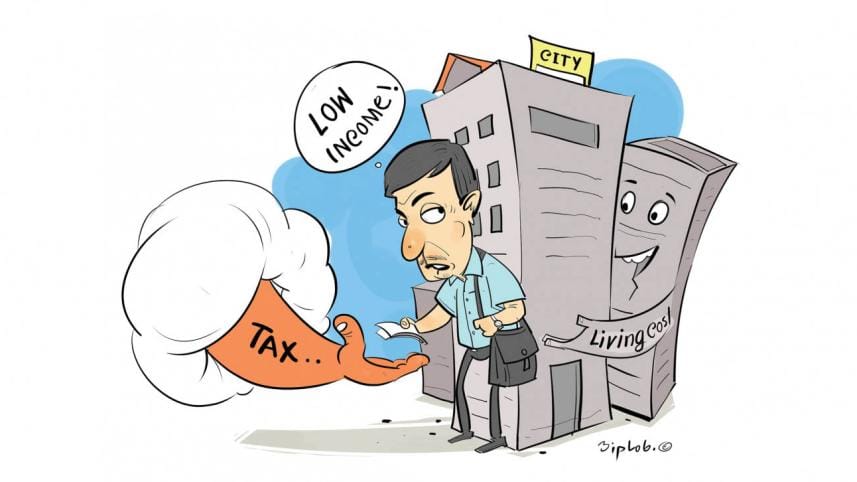FY24 budget ignores fiscal policy as a tool for equitable growth

Inequality has been growing in Bangladesh over the past couple of decades or so. Any effort at halting this process and reversing the trend has to start from a political commitment, an understanding of the factors at work, and adoption of necessary measures to attain the goals.
Instruments of fiscal policy – viz, policies for generating revenues and allocating public expenditures – are potential tools for attaining the twin objectives of economic growth and income redistribution. For example, lower tax rates on low-income groups can result in higher post-tax incomes in their hands, thus enabling them to spend more. Higher expenditure on goods and services, through expanding markets, can create an incentive for investment and output growth. Thus, the goals of equity and growth can be attained simultaneously. On the other hand, the lowering of taxes on profits can be used as a means of promoting growth through the investment route. That route is expected to generate incomes in the hands of lower-income groups indirectly through employment growth which may or may not materialise.
Fiscal policy instruments help move towards a higher growth trajectory and an equitable and just society when an economy relies more on direct taxes, because they can be made progressive. For example, rates of income taxes can be varied by income groups – with progressively higher rates for upper-income groups. Wealth taxes can be progressive if imposed on wealth above a certain level.
Examples of progressive taxes and equitable income distribution are present in the Nordic countries (e.g. Norway, Sweden, Finland, Denmark). In these countries, tax rates for high-income groups are quite high, and income distribution is more equal than other capitalist countries. The rich people in these countries do not resent high tax rates simply because the revenues generated through taxes are utilised efficiently, and benefits are received by the people. Furthermore, the process of tax payment is smooth and hassle-free, and the use of taxpayers' money is transparent.
Indirect taxes are by nature regressive, and hence a greater reliance on them go against the principle of equity. For example, VAT and import duties are usually borne by buyers of the relevant goods and services, irrespective of their levels of income. Buyers of all income groups bear these taxes at the same rate. Of course, some nuances can be introduced by using multiple rates – with lower rates for items that are more likely to be bought by the lower-income people in larger quantities.
Tax policies in developed countries usually vary depending on the political party in power. Conservative parties (e.g. Republicans in the US, Conservatives in the UK) usually favour low corporate taxes as a means of encouraging businesses to invest. The argument is that low taxes will encourage investment, and hence growth of output and employment. Democrats and social democrats, on the other hand, favour lower rates of income taxes for lower-income groups and higher expenditures, especially on infrastructure and social sectors like education and health. Lower taxes for low incomes would result in more take-home income for such people, which, in turn, should encourage investment through the multiplier effect of a rise in consumption expenditure.
Going beyond taxes, public expenditure can be used to provide benefits to the poor and lower-income groups. Examples of such expenditures include: i) free healthcare for people of low-income groups; ii) education grants for children of such groups; iii) employment programmes for the poor; and iv) social safety nets for the poor.
The tax regimes in Bangladesh are more dependent on indirect taxes like VAT, import duty, etc, and hence are regressive in nature. The incidence of such taxes is usually on the consumers, irrespective of their income levels. In the budget for FY2022-23, the rates of corporate tax were reduced. Although they have been kept unchanged in the proposed budget for FY2023-24, the overall policy environment remains geared towards providing favours to big businesses. This kind of policy is not only not conducive to reducing inequality, but they help exacerbate it.
Historically, issues of equity and social justice have not been given much importance in the process of budget formulation in Bangladesh. Although there is a brief mention of this issue in the budget speech for FY2023-24, the rhetorical nature of this mention is exemplified by the continued reliance on indirect taxes, reluctance to raise direct taxes (e.g. income tax) on the upper-income groups, and neglect of wealth and inheritance taxes as a means of taxing those who are capable of paying taxes. Instead of doing so, the more regressing path of relying on indirect taxes has continued. The latest example of such an approach is the mandatory contribution of Tk 2,000 irrespective of whether a person has taxable income or not.
Currently, income tax accounts for only a third of the total tax revenue of the country. The rest comes from VAT, import duty, supplementary duty, etc. Revenue from income tax registered the lowest growth during July-January period of FY2022-23. Direct tax-GDP ratio declined over almost a decade. No attempt has been made to reduce the dependence on indirect taxes.
The only notable effort to raise revenues is to expand the tax net. This, of course, is desirable, because out of the 40 million people who are regarded as capable of paying taxes by the National Board of Revenue (NBR), only 8.8 million have TIN and 3.2 million submitted returns in FY2022-23. However, reliance on only this for raising revenues and taxing people even if they don't have taxable income show the government's attitude towards inequality.
While efforts are needed to expand the tax net, not considering additional measures like raising the tax rates for higher income slabs and ignoring the possibility of wealth tax are indicative of the lack of seriousness regarding the issue of equity and social justice.
Coming to public expenditure, beyond free primary education, there is very little by way of pro-poor policies. Likewise, in health, community clinics were ostensibly thought of as a means for providing health care to the poor, but the quality of services provided through them is a big question. Also important is the issue of healthcare for the urban poor.
Productive employment is an important means of generating income for the poor and low-income people, and hence policies in this area can have important implications for equitable growth. But the proposed budget, like its predecessors, offers precious little in terms of incentives for job creation by private entrepreneurs. The lone paragraph on the issue in the speech mentions that the government is "implementing suitable programmes for sustainable employment generation," although there is nothing more on what those programmes are. In the paragraph on industry, export diversification and support to labour intensive industries are mentioned, but nothing specific is seen on how to achieve such goals, and especially on how non-RMG labour-intensive industries can be promoted.
Programmes for job creation through infrastructure are common in developing countries, and are used especially when the growth of output fails to generate jobs needed to absorb the growing labour force. Although such programmes continue to exist in Bangladesh, allocations for them have remained static for some years now. In the FY2023-24 budget, the wage rate for such programmes have been raised to Tk 400 per person per day, but that is still lower even than the going wage rate in agriculture.
Social safety nets consist of a plethora of minuscule programmes, many of which were designed basically to serve political purposes. For example, even after the proposed increase to Tk 600 per person per month, the old age allowance will be just about one day's wage in the rural areas. The coverage, despite a small increase, remains small compared to the total number that is potentially eligible.
On the whole, it seems that fiscal instruments as a tool for equitable growth continue to be ignored in the budgetary process. If the government is serious about the issue of equitable growth, it can undertake measures necessary in the areas of revenues and expenditures that are well-known. What is important is the political will to do so.
Dr Rizwanul Islam is an economist and former special adviser to the Employment Sector, International Labour Office, Geneva.



 For all latest news, follow The Daily Star's Google News channel.
For all latest news, follow The Daily Star's Google News channel. 


Comments